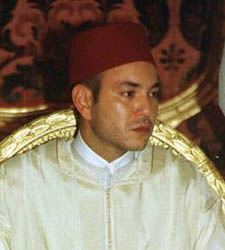Ten years on, mixed balance sheet for Moroccan King Mohammed
 Rabat/Madrid - Ask Moroccans what they think about King Mohammed VI, who marks the 10th anniversary of his accession to the throne on Thursday, and you are likely to get a positive answer.
Rabat/Madrid - Ask Moroccans what they think about King Mohammed VI, who marks the 10th anniversary of his accession to the throne on Thursday, and you are likely to get a positive answer.
"The king is good," says a taxi driver in the northern city of Meknes, while a 30-year-old Rabat teacher describes the monarch as "helping the poor."
Among ordinary Moroccans, any ruler issued from the north African country's centuries-old Alawite dynasty would inspire respect, and King Mohammed's visits to poor areas have also earned him a certain personal popularity.
But as Morocco prepares to mark the anniversary with relatively modest festivities, the balance sheet is not just positive. Some observers see the king as an "eternal crown prince" who is more interested in leisure activities than politics.
Mohammed's accession to the throne in 1999 raised enormous hopes in Morocco, which his father Hassan II had ruled for 38 years with an iron fist.
King Hassan ruthlessly suppressed political opponents and failed to solve rural poverty, urban slums, an illiteracy surpassing 40 per cent, academic unemployment and other pressing problems.
Mohammed VI, whom some urban Moroccans chummily call M6, became known as "the king of the poor." He still partly retains that image, sometimes driving his own car and not always expecting his subjects to kiss his hand.
Mohammed has made several visits to impoverished northern areas which Hassan neglected, and appears to take a genuine interest in improving infrastructure and other living conditions of the poor.
The 45-year-old king is also credited with increasing press and political freedoms, though crackdowns on Islamist terrorism have again led to the freedoms being curtailed in recent years.
Newspapers are still closed, demonstrations repressed and detainees tortured in Morocco, though it happens less than under king Hassan, according to analysts in Rabat.
Mohammed VI took the bold step of creating a commission to compensate victims of human rights abuses under his father's rule, though human rights activists regard the body's achievements as insufficient.
The king has also earned praise from liberal quarters for a "feminist" reform of family legislation, including raising marriage age to 18, improving women's rights in situations of divorce, and making it more difficult for men to take more than one wife.
The young king modernized the image of the monarchy, dissolving his father's harem and allowing his wife Salma, with whom he has two young children, to play a discreet public role.
However, Morocco's power structures have remained untouched, with the palace still wielding vast powers that exceed those of the government.
The king appoints five key ministers and other decision-makers, can veto any government decision, and launch new measures without consulting the government.
Yet unlike his father, Mohammed VI is not a born politician, and often feels the need to take a break from palace life, going on trips abroad that can even last a month at a time.
The king who dreamed of freedom neglected his duties, baffling Moroccans with his constant absences, and disappointing hopes of reform, Spanish journalist Ferran Sales wrote in his book on Mohammed VI.
Most Moroccan analysts refrain from criticizing the king so openly, blaming political problems on his advisors or on the government in the country where questioning the monarchy can lead to a prison sentence.
Subjects that few Moroccan journalists have dared to tackle include the annual budget of the royal palace, which the Paris weekly Jeune Afrique estimates at 250 million euros (350 million dollars).
King Mohammed's concern for the poor does not mask the fact that he continues to live in breathtaking luxury, owning palaces around the country and controlling large sectors of the economy.
A huge gap separates the ruling elite from the masses in the country where more than 30 per cent of homes do not have electricity or running water.
Mohammed VI still needed to "propose Moroccans a real future perspective," Jeune Afrique wrote. (dpa)